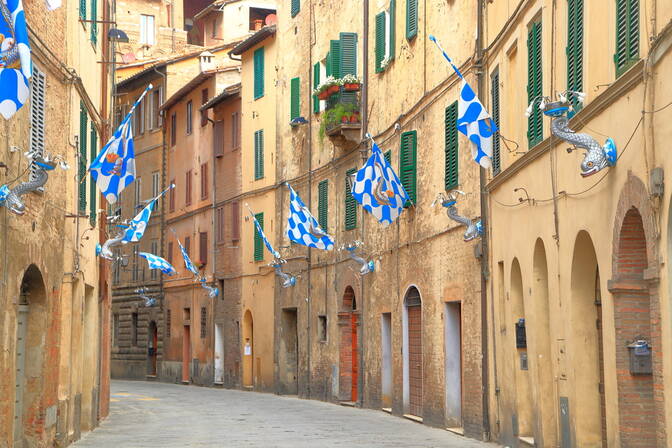Palio di Siena
July 2, Thursday
Tuscany
August 16, Sunday
Tuscany

History and significance
The Palio has been held since the 13th century and originally had a religious meaning — the race was organized in honor of the Virgin Mary, the patron saint of the city. Over time, the Palio turned into an important public event that unites various districts of Siena — the contrade. Each contrada is a historic district with its own symbols, traditions, and devoted residents.
When it is held
The festival takes place twice a year — on July 2 and August 16. Each race is accompanied by several days of preparations, rehearsals, and festive events.
Main elements of the festival
The Palio is not just a race, but a large-scale cultural festival that includes:
* Ceremonial processions in historical costumes reflecting medieval traditions
* Blessing of riders and horses before the race in Siena Cathedral
* Rituals and ceremonies aimed at attracting luck and protection
* The horse race itself on Piazza del Campo — Siena’s main square paved with special clay
* Victory celebrations of the winning contrada with fireworks, music, and dancing
The role of the contrade
Siena is divided into 17 contrade, each having its own coat of arms, flag, and even its own sacred patron. Ten contrade participate in each Palio, selected alternately. For the residents of the contrade, participation in the Palio is a matter of honor and an expression of loyalty to their district.
Modern significance
The Palio is not only a sporting competition but also a living cultural heritage of Siena that preserves the spirit of medieval Italy. This festival unites people, supports historical traditions, and contributes to tourism development in the region.
Interesting fact
Each horse and rider receive their unique symbolism, and preparations for the race include special rituals and even "agreements" with horse owners. The race is very dangerous and requires great skill from the riders.
Conclusion
Siena Palio is a bright and lively festival that preserves medieval traditions and is an important part of Italy’s cultural heritage. For the residents of Siena and visitors to the city, this event becomes a true celebration of unity, strength, and history.
